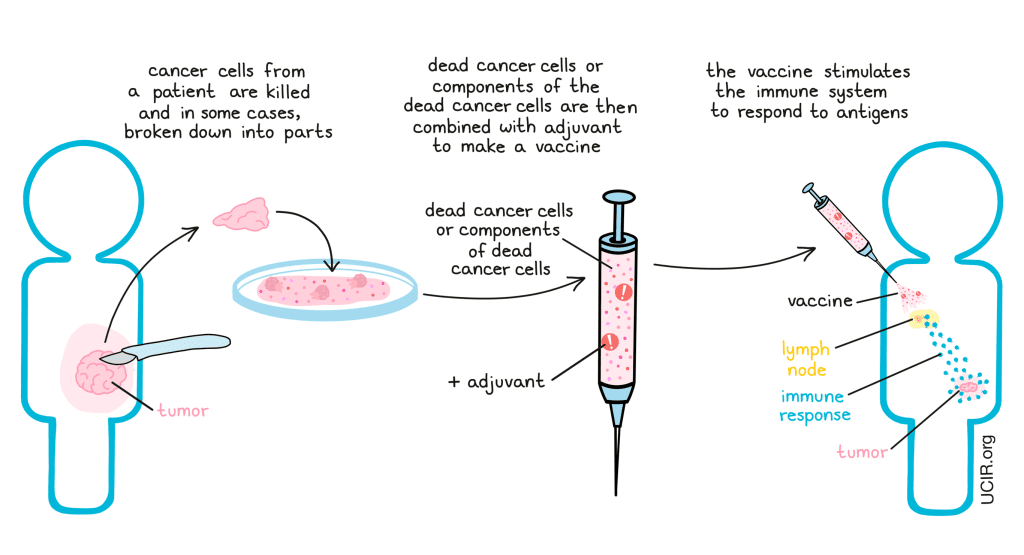In the realm of cancer treatment, a groundbreaking new development has emerged—a cancer vaccine that trains the immune system to recognize and attack tumor cells. This innovative approach marks a significant leap forward in the fight against cancer, offering hope for more targeted and effective treatment. But how exactly does this vaccine work, and why is it considered a game-changer? Let’s dive into the science behind it and explore its potential impact on cancer therapy.
Understanding How the Cancer Vaccine Works

Unlike traditional vaccines designed to prevent infections, the cancer vaccine is crafted to help the immune system actively fight cancer cells. This revolutionary vaccine operates on a unique principle—teaching the immune system to identify and destroy tumor cells as if they were harmful invaders.
Teaching the Immune System to Recognize Cancer Cells
The core concept behind this vaccine is simple yet powerful: train the body to recognize cancer-specific proteins or antigens. Once introduced, these antigens activate immune cells, particularly T-cells, prompting them to target and eliminate tumor cells. Essentially, it reprograms the body to see cancer as a threat, just like it would with viruses or bacteria.
This process is groundbreaking because cancer cells often evade the immune system by disguising themselves as normal cells. By marking these cells with unique antigens, the vaccine essentially unmasks the tumor, making it a prime target for immune attack.
Boosting the Immune Response
Beyond recognition, the vaccine also bolsters the body’s natural defenses. Once activated, the immune cells become more aggressive in seeking out cancerous cells, not just in the primary tumor but potentially throughout the body. This heightened immune response could significantly reduce tumor growth and help in early cancer detection.
Video : A vaccine that trains your body to fight cancer? The future is here! 🧬💉.
Potential Benefits of the Cancer Vaccine
This innovative vaccine offers several advantages over traditional cancer treatments such as chemotherapy and radiation. These benefits make it a promising candidate for widespread clinical application.
Targeted Therapy with Fewer Side Effects
One of the most significant benefits of this vaccine is its precision. Unlike chemotherapy, which indiscriminately attacks both healthy and cancerous cells, the vaccine specifically targets tumor cells. This selective approach minimizes side effects like nausea, hair loss, and fatigue, allowing patients to maintain a better quality of life during treatment.
Think of it as a guided missile rather than a carpet bomb—hitting the enemy without causing unnecessary collateral damage. This precision not only improves patient outcomes but also reduces the physical and emotional toll of cancer treatment.
Long-Term Protection and Immunity
Another remarkable feature of the cancer vaccine is its potential for long-term protection. Once the immune system learns to recognize cancer cells, it can retain this memory for future encounters. This means that even if cancer recurs, the body is better equipped to mount a defense.
By creating a kind of immune “memory,” the vaccine reduces the chances of relapse. This ongoing protection could make a significant difference, especially for cancers prone to recurrence, such as melanoma or breast cancer.

Personalization for Optimal Results
Cancer is a complex and diverse disease, varying greatly from patient to patient. The vaccine’s ability to be personalized based on an individual’s unique tumor markers makes it an incredibly versatile tool. By tailoring the vaccine to each patient’s specific cancer profile, doctors can maximize its effectiveness, leading to more successful outcomes.
This personalized approach is a step toward precision medicine, where treatments are custom-built to meet the unique needs of each patient, increasing both efficacy and safety.
Challenges and Considerations
Despite its promising potential, the cancer vaccine faces several challenges that must be addressed before it becomes a mainstream treatment.
Tumor Variability: A Moving Target
One of the primary obstacles is the variability of cancer itself. Tumors can evolve and mutate rapidly, sometimes altering their antigens. This evolution means that a vaccine effective against one version of a tumor may not work against another. Scientists are actively researching ways to adapt the vaccine to these changes, but it remains a significant challenge.
Access and Cost: A Barrier to Treatment
Developing and distributing such an advanced vaccine is no small feat. Production costs can be high, and ensuring that it is affordable and accessible to everyone remains a critical issue. Governments, healthcare providers, and researchers must work together to find ways to subsidize and distribute this treatment.
The Future of Cancer Treatment: A Paradigm Shift

The introduction of the cancer vaccine could fundamentally change how we approach cancer therapy. Rather than relying solely on toxic chemicals or invasive procedures, we may soon be leveraging the body’s own immune system to combat the disease naturally and effectively.
Integrating with Existing Treatments
While the vaccine itself is promising, combining it with current treatments like surgery, chemotherapy, or targeted therapies could provide comprehensive care. The vaccine could help shrink tumors before surgery or prevent recurrence after initial treatment, offering a holistic approach to cancer care.
Ongoing Research and Future Prospects
As researchers continue to refine the vaccine, clinical trials are expanding to include various types of cancer, from melanoma to lung and breast cancers. These studies aim to test the vaccine’s safety, effectiveness, and long-term benefits, paving the way for FDA approval and public availability.
A Glimpse of Hope: Personal Stories
Patients who have participated in early trials have reported remarkable improvements. One such patient, diagnosed with advanced melanoma, saw significant tumor shrinkage after receiving the vaccine. Stories like these fuel hope that cancer may soon be less of a life-threatening diagnosis and more of a manageable condition.
Video : S4E08: Learning from Vaccines: Training our Immune System to Fight Cancer
Final Thoughts: Hope for a Cancer-Free Future
The development of a cancer vaccine represents a revolutionary advancement in medical science. By harnessing the body’s natural defenses, this innovative treatment offers a more humane and effective way to fight cancer. While challenges remain, the potential to reduce suffering and save lives makes it a cause worth pursuing.
Cancer affects millions of lives every year, but with the advent of this vaccine, we may finally be turning the tide. Staying informed, advocating for research, and supporting clinical trials can help bring this life-changing treatment to those who need it most.
Let’s remain hopeful that one day, cancer may no longer be the fearsome enemy it once was.


